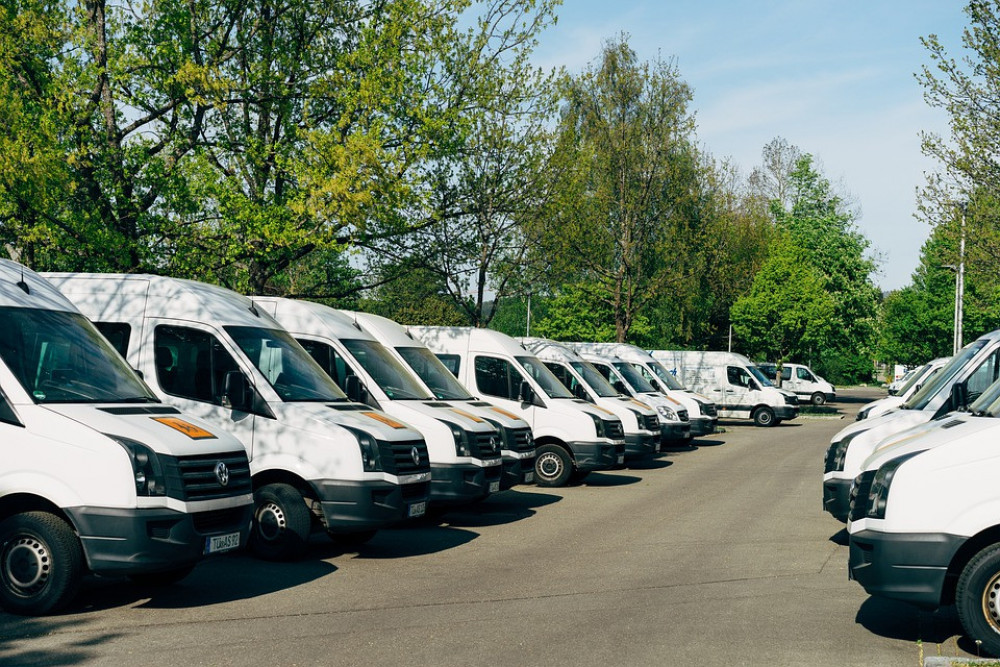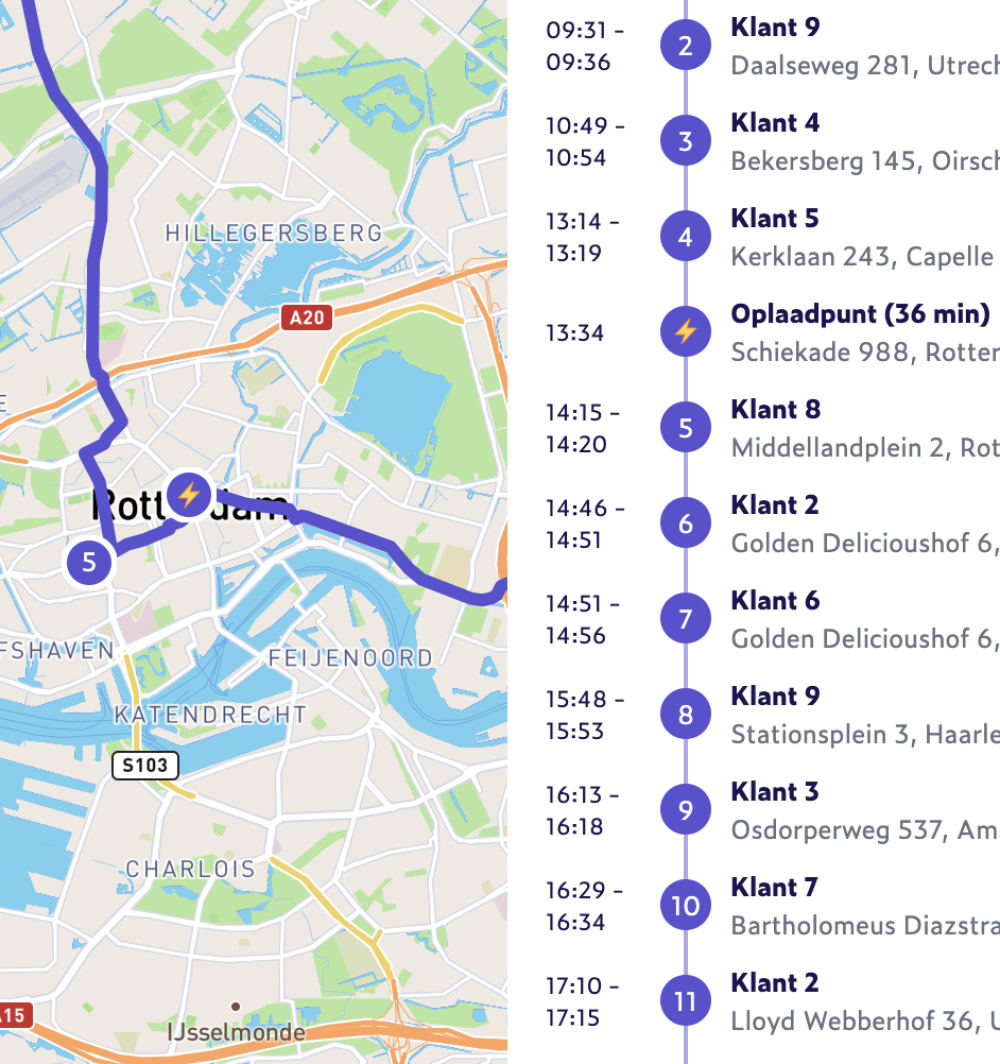Electric vans: pros and cons

Electric vans - 8 advantages and 5 disadvantages listed
More and more companies are looking for ways to save on high fuel costs and are switching to electric vans. We take you through the most frequently asked questions and give you the best possible answers to them. Read on quickly and find all the answers to the questions you have when deciding to buy electric vans.
In this article, we give you 8 advantages (and reasons) to switch to an electric van and 4 disadvantages.
8 benefits of electric vans (and reasons to switch)
We give you some benefits and reasons to trade in your diesel or petrol van for a new(er) electric van.
1. Better for the environment
You probably didn't expect this... but an electric van doesn't emit any co2 which means it doesn't burden the environment.
2. Low maintenance costs
Where a petrol or diesel van still has a lot of rotating parts (engine, gearbox etc.) an electric van does not. Sure the battery pack may need replacing over time (you are talking about vans older than 10 years). But the gearbox, for instance, cannot break down, because it is not in there.
3. Subsidy for electric vans
While subsidy is probably not the best reason to buy an electric van, it does help. After all, an electric van is still generally more expensive than one that uses diesel or petrol. It can give that push to purchase. On this page, below, we also go into what subsidies are available.
4. Urban logistics
Many inner cities will soon be closed to polluting vehicles. The diesel/petrol delivery van will simply no longer be welcome in city centres or environmental zones. This makes an electric delivery van an ideal alternative for city logistics. 30 municipalities expect city centres to be locked as early as around 2025. Some of these municipalities are: Amsterdam, Rotterdam, Haarlem, Eindhoven and Maastricht. Many smaller municipalities and villages will follow suit.
Besides saving the environment, the noise for local residents is also an excellent reason to go for electric vans. The engine does not kick in every time, reducing the nuisance for inner-city residents.
The tipping point has not yet been reached; there are still some bumps to be taken. The charging infrastructure still needs to be more extensive, the range of vans still needs to increase and there is still limited choice of van models. However, a forward-thinking entrepreneur already has an idea of where things are heading. So are you as an entrepreneur leading the way or...?
5. Total cost of ownership of electric vans decreases
An electric van is currently still a lot more expensive to buy than the same petrol or diesel model. This is a matter of time. The more demand there is, the more manufacturers will respond. The production of electric vans will increase as demand increases and a wider range of models will become available.
However, the energy cost per kilometre and maintenance of electric vans is already lower than diesel or petrol vans. This difference is expected to widen with rising fuel prices. The government is also encouraging the switch to electric vehicles by, for instance, not charging road tax and keeping excise duty on petrol and diesel high or even increasing it in the coming years.
6. Electric van range is expanding
The number of models currently offered by manufacturers is still limited. But here too, if demand increases, manufacturers will respond smartly by also expanding the range.
7. Electric driving gives you a green image as a company
Consumers, but also companies, consider it increasingly important that the companies they work with treat people, animals and our planet well. If you choose to buy electric vans, this will reflect well on your company. After all, it shows that you care about the environment and are taking steps to reduce your company's foodprint.
8. The driving experience of an electric van
An electric van also gives your drivers more comfort. For instance, they are quieter, have a lot of tractive power and road handling is very good. If you drive a lot of short trips, you also don't have to start the vehicle every time, you don't actually notice the starting with an electric van. So sit down and drive off.
Are there any drawbacks to an electric van? Unfortunately the switch is not without drawbacks, so we share those with you too in the next section of this page.
4 disadvantages of electric vans
The benefits, they sound nice, but are there any downsides to electric vans? Yes there are, come they:
1. Loading, loading and...loaaading
If you go to fill up with a petrol or diesel van it will take you about 5-10 minutes each time. With an electric van, you can take a bit more time for that. Count on an hour to be 80% fully charged.
There are different types of chargers. DC chargers, or fast charging stations (e.g. Fastned or Allego) with a capacity of 50KW. Wallboxes you can hang at your premises, usually delivering around 25KW of power. A public charging point is also an option but due to the processed capacity of around 3.7KW per hour, you will be standing here for many hours. So that is not an option for when you need to move on quickly again.
A calculation example: suppose you drive a Nissan e-NV200 Evalia. The battery is 40 kWh and the power that can be charged is 6.6 kWh. So you would need about (40/6.6) 6 hours for a full battery. The charging capacity of electric vans will increase, allowing you to charge on the road. Now, charging on the road is doable if you need to drive just a little bit, but not to charge the entire battery. It is better to fully charge the entire battery when the vehicle is stationary, such as in the evening or at night, so that you can hit the road the next day with a charged van.
2. Purchase price of electric vans
The purchase price of electric vans is currently still higher than that of its fellow petrol or diesel vans. As demand increases, the price will also fall so this is likely to resolve itself in the coming years.
3. Range limited
Electric vans have different range radiuses. A Citroen e-Jumpy will take you 330 kilometres (75 kWh battery pack), a Mercedes-Benz eVito (60 kWh battery pack) 284 kilometres. You could say that electric vans currently have a range of 250-400 kilometres. Depending on the load and weather, of course.
You have a bigger challenge if you deliver refrigerated goods, e.g. food. Refrigeration affects your vehicle's range. Refrigeration requires additional energy, leading to a shorter driving distance before the batteries need to be recharged.
To address this challenge, innovative solutions are being developed, such as using solar panels on the van roof to generate extra energy. Smart energy management systems are also being experimented with to improve energy efficiency.
4. Limited range of models
Although the number of models is growing (and will continue to grow), the number of types of vans you can buy is still limited. Further down this page, we write which electric vans are currently on the market.
We hope that by weighing up the above advantages and disadvantages, you can make a good choice for your electric van. We have even more information available that can help you make a careful consideration, all this information can be found via the links below.
- What electric vans are on sale?
- What does an electric van cost?
- What is the cheapest electric van?
- Which electric van has the greatest range?
- What is the towing weight of an electric van?
- How long does it take to charge an electric van?
- How long does it take to charge an electric van? Which electric vans charge the fastest?
- What is the cost per km when driving electric vs diesel?
- What is the best electric van?
- How do I plan the best route with electric vans?
- What are the pros and cons of electrifying your fleet?
What is the alternative to an electric van?
Are there already alternatives to enter zero-emission zones or to make your last-mile delivery service sustainable? Yes there are alternatives to the electric van. Manufacturers are working hard on hydrogen vans. These developments parallel those of the electric van. Which type of transport will win is currently unclear. However, we can explain the pros and cons to you. You can read all about hydrogen vans in this article.

Planning routes for electric vehicles
If you have already purchased or are about to purchase electric vehicles, it is important to think about your routes. How do you plan efficient routes with electric vans and distinguish between addresses that are inside and outside zero-emission zones.
RouteLogic is the only route optimisation software that allows you to plan routes with electric vehicles.
- Automatic inclusion of available charging stations in your routes
- Clear charging instructions for your drivers
- Clear communication to your customers with correct ETA including charging time
- Automatic visibility of whether an address is inside or outside a zero-emission zone
- Automatic scheduling of zero-emission addresses in zero-emission vehicles
- Possibility of multiple charging on the road
- Taking into account smart charging strategies
- Ability to schedule mixed fleets (diesel and electric) at once
Frequently asked questions about electric vans
There are several names for a van. Some people call it a van or a van. Whatever name you use it is actually all exactly the same. However, a van is generally talked about more often than a van or delivery van. So perhaps you can conclude from this that the best designation is still a van. In Belgium, by the way, they use another word for a van. There, they also call a van a chameleon.
- Better for the environment
- Low maintenance costs
- Subsidies are available
- Super suitable for city logistics
- Lower total cost of ownership
- Supply of electric delivery vans is expanding
- Electric driving gives your company a green image
- The driving experience of an electric van
Purchase price is higher than a diesel or petrol bus
Range is limited
- Limited number of models